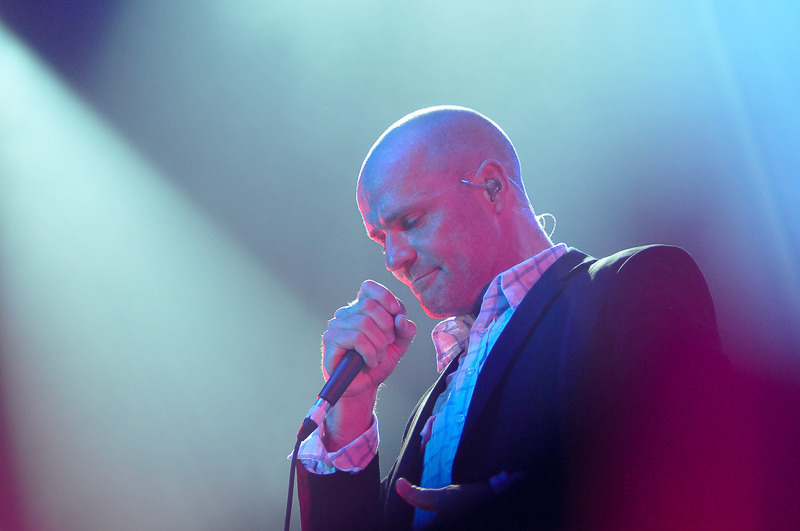When I was a kid in the mid nineties most of my music listening happened through the Sony Cassette Walkman my Grandma gave me for my birthday. I don’t remember being enthralled with my parents cassette collection; Rod Stewart, Fine Young Cannibals, Simply Red and other detritus of late-eighties Adult Contemporary radio, but it also had an AM/FM radio and I used to power through AA batteries staying up too late listening to Toronto stations.
On Saturday nights 104.5 CHUM-FM would broadcast their weekly chart show where Roger Ashby would count down the top 30 singles in the station’s format and I’m pretty sure that’s when I first heard The Tragically Hip’s “Ahead by a Century”.
According to Wikipedia, that show didn’t start broadcasting until January 10, 1998—my tenth birthday—but “Ahead by a Century” was released as a single April 22, 1996, a year and a half earlier. The song was still on the chart, whether by CanCon or by popularity, it had a place.
It stood out, otherwise I wouldn’t have remembered it. It had dynamics and sublety. It had lyrics that captured a specific feeling, a time and place, a real complex display of emotion in contrast to the other music on the Top 30. The song was a cool steel gray in the time of dumbass bright post-grunge. I don’t remember hearing any other songs on the radio as clearly as I remember hearing it.
The steely acoustic riff and filtered drums gave way to an open chord in widescreen for “and that’s when the hornet stung me”. Those vocals; yawning or snarling. Sometimes a stuttering drawl, sometimes with a sneer with a snap. Gord Downie paints a cold domestic atmosphere with his throat. Whatever was going on in the backyard between the protaganist and the “insects” felt visceral and realistic, and yet still got a nation to remember the words.
The Hip’s musical palette is a simple one. They weren’t chasing power chords, sampling or crushing everything with compression like their more fashionable contemporaries. They were a guitar band who liked guitar bands and played like it, but this only provided a smooth and flexible foundation for Gord’s lyrical concepts.
Growing up in Canada means being irradiated by culture coming across the border from the south. America is a like a neighbour who builds a McMansion, has the music too loud and won’t shut the goddamn blinds. It’s so loud that it’s hard to make out any sort of Canadian identity. People usually talk about it in negatives; like being Canadian is about being something that Americans aren’t.
But The Hip taught me about Canada inclusively, not exclusively. We have our own history, with its controversies, tragedies and victories. David Milgaard, Corduroy Roads, Bill Barilko, the Christie Pitts riot aren’t things that were mentioned in school, but form such a fundamental part of our history and our memory.
I went to university in Kingston, Ontario; home of The Hip. One summer I worked an internship taking photos for The Kingston Whig-Standard, the local paper. I used to drive out of town for assignments often; down King Street, through the small village of Millhaven. Before reaching town there’s an assuming road that crests a stout ridge to the right. On top of this hill is Millhaven Institution, a maximum security prison that inspired The Hip’s “38 Years Old”. When built in the 1970’s it was Canada’s highest-security prison, housing the worst of the worst. It has a history of inmate riots and hunger strikes. If there wasn’t a sign you wouldn’t know it’s there; if there wasn’t The Hip you wouldn’t know it existed.
Last year I finally read Hugh Maclennan’s The Watch That Ends The Night, a delicate novel that inspired “Courage”. It’s all about a man’s struggle against forces and people just beyond his control, treading water and struggling to stay above the surface in a rough sea. As noted by Stephen Dame, one of those forces is modernism and it’s rudderlessness after two world wars.
In a way The Hip are a statement against forces we can’t control: Canadian culture against the tsunami from the south, staying literate when rock and roll isn’t, death and the unknown. They stayed true to their subjects and interests and there will be a void when they stop. Is Justin Bieber gonna write a song about Attawapiskat? No fucking way.
Last Saturday was the last show on The Hip’s Man Machine Poem tour, possibly the last show they’ll ever play. I went to Sorauren Park in Toronto to see it projected on a screen with what I expected to be a modest crowd. Instead, there were thousands of people crammed into a grassy patch the size of a football field and I was completely dumbfounded. Whether they were there as fans or for the spectacle of the event itself, more than 12 million people watched that show. Whether conscious or not, they knew how important The Hip is to us and how they tell us about ourselves.

n.b. Please check out The Hip Museum, a meticulously researched directory of references and meanings of The Tragically Hip’s music by Stephen Dame.